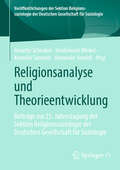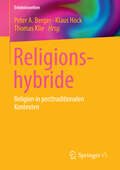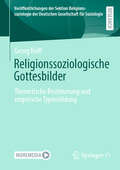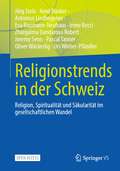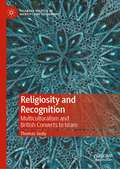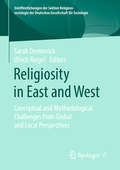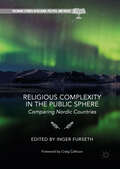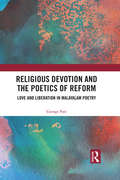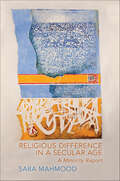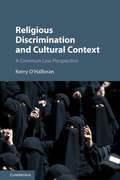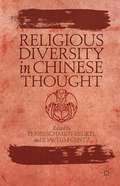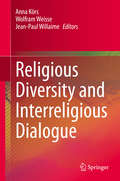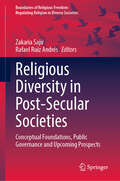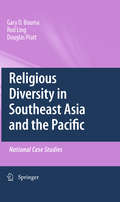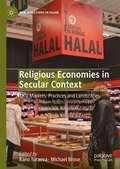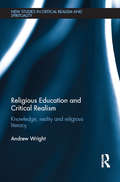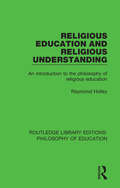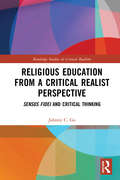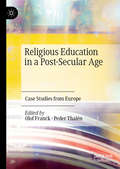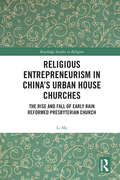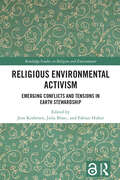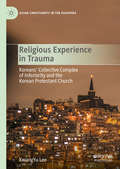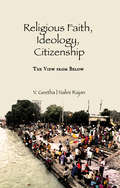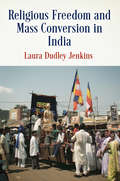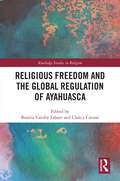- Table View
- List View
Religionsanalyse und Theorieentwicklung: Beiträge zur 25. Jahrestagung der Sektion Religionssoziologie der Deutschen Gesellschaft für Soziologie (Veröffentlichungen der Sektion Religionssoziologie der Deutschen Gesellschaft für Soziologie)
by Heidemarie Winkel Kornelia Sammet Alexander Yendell Annette SchnabelReligion ist ein gesellschaftliches Feld, das starken Dynamiken unterworfen ist: Religion und Religiosität reagieren sensibel auf sozialen Wandel, treiben ihn mit ihren Eigendynamiken voran oder blockieren ihn. Der vorliegende Band entstand im Anschluss an eine Tagung anlässlich des 25-jährigen Bestehens der Sektion Religionssoziologie der Deutschen Gesellschaft für Soziologie. Die Beiträge spiegeln die lebendige soziologische Forschung zu der engen Koppelung von Religion(en) und Gesellschaft und haben eine explizit feld-historische Perspektive: Sie thematisieren sowohl Veränderungen dieser Verzahnungen als auch die theoretischen und empirischen Erforschungsperspektiven und bilden die damit verbundenen aktuellen Diskurse innerhalb der deutschen Religionssoziologie ab.
Religionshybride
by Peter A. Berger Klaus Hock Thomas KliePosttraditionale Gemeinschaften tragen durch die Erschaffung ortsgebundener Utopien mit eigenen Mythen und Ritualen zur Wiederverzauberung der Welt bei, so der französische Soziologe Michel Maffesoli. An der Universität Rostock wird untersucht, inwiefern diese Gemeinschaften Ausdrucksgestalten einer Religionsproduktivität darstellen. Bilden sich über eine religionshybride Kultur neue Formen von Religion oder religiös überformte Lebensstile jenseits institutionalisierter Religionspraktiken heraus? Entgegen der revisionsbedürftigen These vom Verschwinden der Religion soll in Erfahrung gebracht werden, wie sich Religion an alten Dorfkirchen und anderen auratischen Orten möglicherweise neu und anders herausbildet. In den Blick geraten somit auch die besonderen Formen von Vergemeinschaftung und Vernetzung, Festkulturen und Events wie Hoffeste, Werthaltungen und soziale Motive.
Religionssoziologische Gottesbilder: Theoretische Bestimmung und empirische Typenbildung (Veröffentlichungen der Sektion Religionssoziologie der Deutschen Gesellschaft für Soziologie)
by Georg ReiffDieses Buch untersucht individuelle Gottesvorstellungen christlicher Gläubiger. Auf Grundlage der in einer qualitativen Interviewstudie erhobenen empirischen Daten werden individuelle Gottesbilder rekonstruiert und innerhalb einer Typologie auf ihre Wirkweise und Wirkstärke hin systematisiert. Bislang hat die religionssoziologische Theorie Religion als ein System von Glaubensüberzeugungen, Riten und Werten definiert, das sich auf einen Gott, eine höhere Macht oder eine übernatürliche Entität bezieht. Was jedoch genau unter dieser zentralen Glaubenskategorie verstanden wird bzw. wie die Gläubigen selbst diesen intimen Bezugspunkt des eigenen Glaubens definieren, war bislang noch nicht Bestandteil der Debatte. Das Gottesbild als neues theoretisches Konstrukt wird daher in diesem Buch in die religionssoziologische Theoriedebatte eingeführt. Es wird hierbei theoretisch innerhalb von Religion verortet, seine individuelle Entstehung nachskizziert und typologisiert.
Religionstrends in der Schweiz: Religion, Spiritualität und Säkularität im gesellschaftlichen Wandel
by Irene Becci Jörg Stolz Antonius Liedhegener Oliver Wäckerlig Arnd Bünker Eva Baumann-Neuhaus Zhargalma Dandarova Robert Jeremy Senn Pascal Tanner Urs Winter-PfändlerDiese Open-Access-Publikation beschreibt gegenwärtige Entwicklungen in der Religionslandschaft der Schweiz. Sie führt eine Reihe von Studien fort, die seit den 1980er Jahren in regelmässigen Zeitabständen publiziert werden. Die hier versammelten Beiträge basieren auf der Auswertung aktueller statistischer Daten und bearbeiten Fragestellungen aus der Religions- und Kirchensoziologie sowie aus der Politikwissenschaft.
Religiosity and Recognition: Multiculturalism and British Converts to Islam (Palgrave Politics of Identity and Citizenship Series)
by Thomas SealyThis book argues that multiculturalism remains a relevant and vital framework through which to understand and construct inclusive forms of citizenship. Responding to contemporary ethnic and religious diversity in European states and the position of religious minorities, debates in multiculturalism have revitalized discussion of the public role of religion, yet multiculturalism has been increasingly challenged in both political as well as academic circles. With a focus on Britain and through a study of the narratives of British converts to Islam, this book engages in debates centered around multiculturalism, particularly on the issues of identity, recognition, and difference. Yet, it also identifies and interrogates multiculturalism’s shortcomings in relation to specifically religious identities and belonging. In a unique and innovative analysis, this book combines a discussion of multiculturalism in Britain with insights from political theology. It juxtaposes multiculturalism’s concepts of ethno-religious identity and recognition with the notions of religiosity and hospitality to offer a new perspective on religious identity and the implications of this for thinking with and about multiculturalism and multicultural social and political relations.
Religiosity in East and West: Conceptual and Methodological Challenges from Global and Local Perspectives (Veröffentlichungen der Sektion Religionssoziologie der Deutschen Gesellschaft für Soziologie)
by Sarah Demmrich Ulrich RiegelThe book discusses the theoretical and methodological challenges of an interculturally valid sociology of religion and provides insights into the autochthonous socio-religious research in Muslim societies and Asian countries. In this way, it links discourses that have so far taken place primarily independently of one another. The book goes back to a conference in Münster that questioned the Western foundation of empirical religiosity research, which reaches its limits in the non-American and non-European context, but also with regard to orthodox forms of faith in the Western context.
Religious Complexity in the Public Sphere
by Inger FursethThis book is an empirical comparative study of the complexity of religion in the public spheres of the five Nordic countries. The result of a five-year collaborative research project, the work examines how increasingly religiously diverse Nordic societies regulate, debate, and negotiate religion in the state, the polity, the media, and civil society. The project finds that there are seemingly contradictory religious trends at different social levels: a growing secularization at the individual level, and a deprivatization of religion in politics, the media, and civil society. It offers a critique of the current theories of secularization and the return of religion, introducing religious complexity as an alternative concept to understand these paradoxes. This book is for scholars, students, and readers with an interest in understanding the public role of religion in the West.
Religious Devotion and the Poetics of Reform: Love and Liberation in Malayalam Poetry
by George PatiThe poetry emanating from the bhakti tradition of devotional love in India has been both a religious expression and a form of resistance to hierarchies of caste, gender, and colonialism. Some scholars have read this art form through the lens of resistance and reform, but others have responded that imposing an interpretive framework on these poems fails to appreciate their authentic expressions of devotion. This book argues that these declarations of love and piety can simultaneously represent efforts towards emancipation at the spiritual, political, and social level. This book, through a close study of Naḷini (1911), a Malayalam lyric poem, as well as other poems, authored by Mahākavi Kumāran Āśān (1873–1924), a low-caste Kerala poet, demonstrates how Āśān employed a theme of love among humans during the modern period in Kerala that was grounded in the native South Indian bhakti understanding of love of the deity. Āśān believed that personal religious freedom comes from devotion to the deity, and that love for humans must emanate from love of the deity. In showing how devotional religious expression also served as a resistance movement, this study provides new perspective on an understudied area of the colonial period. Bringing to light an under-explored medium, in both religious and artistic terms, this book will be of great interest to scholars of religious studies, Hindu studies, and religion and literature, as well as academics with an interest in Indian culture.
Religious Difference in a Secular Age: A Minority Report
by Saba MahmoodHow secular governance in the Middle East is making life worse—not better—for religious minoritiesThe plight of religious minorities in the Middle East is often attributed to the failure of secularism to take root in the region. Religious Difference in a Secular Age challenges this assessment by examining four cornerstones of secularism—political and civil equality, minority rights, religious freedom, and the legal separation of private and public domains.Drawing on her extensive fieldwork in Egypt with Coptic Orthodox Christians and Bahais—religious minorities in a predominantly Muslim country—Saba Mahmood shows how modern secular governance has exacerbated religious tensions and inequalities rather than reduced them. Tracing the historical career of secular legal concepts in the colonial and postcolonial Middle East, she explores how contradictions at the very heart of political secularism have aggravated and amplified existing forms of Islamic hierarchy, bringing minority relations in Egypt to a new historical impasse. Through a close examination of Egyptian court cases and constitutional debates about minority rights, conflicts around family law, and controversies over freedom of expression, Mahmood invites us to reflect on the entwined histories of secularism in the Middle East and Europe.A provocative work of scholarship, Religious Difference in a Secular Age challenges us to rethink the promise and limits of the secular ideal of religious equality.
Religious Discrimination and Cultural Context: A Common Law Perspective
by Kerry O'HalloranGenerations of festering culture wars, compounded by actual wars in predominantly Muslim countries, the terrorism of Isis, and the ongoing migrant crisis have all combined to make religious discrimination the most pressing challenge now facing many governments. For the leading common law nations, with their shared Christian cultural heritage balanced by a growing secularism, the threat presented by this toxic mix has the potential to destabilise civil society. This book suggests that the instances of religious discrimination, as currently legally defined, are constrained by that cultural context, exacerbated by a policy of multiculturalism, and in practice, conflated with racial, ethnic or other forms of discrimination. Kerry O'Halloran argues that many culture war issues - such as those that surround the pro-choice/pro-life debate and the rights of the LGBT community - can be viewed as rooted in the same Christian morality that underpins the law relating to religious discrimination. Suggests that present forms of religious discrimination are shaped by past cultural traditions. Demonstrates how many culture war issues - such as abortion and gay marriage - are forms of religious discrimination. Provides a comparative analysis of religious discrimination case law which shows how judicial treatment of matters such as accommodating religious belief in the workplace varies on a jurisdictional basis.
Religious Diversity In Chinese Thought
by Perry Schmidt-Leukel Joachim GentzThis collection of essays by major scholars analyze the religious diversity in Chinese religion, bringing together topics from traditional and contemporary contexts and Chinese religions' encounters with Western religion.
Religious Diversity and Interreligious Dialogue
by Anna Körs Wolfram Weisse Jean-Paul WillaimeThis edited volume offers solutions on the challenges of religious pluralisation from a European perspective. It gives special attention to interreligious dialogue and interfaith relations as specific means of dealing with plurality. In particular, the contributors describe innovative scientific approaches and broad political and social scopes of action for addressing the diversity of beliefs, practices, and traditions. In total, more than 25 essays bring together interdisciplinary and international research perspectives. The papers cover a wide thematic range. They highlight how religious pluralisation effects such fields as theology, politics, civil society, education, and communication/media. The contributors not only illustrate academic debates about religious diversity but they also look at the political and social scope for dealing with such. Coverage spans numerous countries, and beliefs, from Buddhism to Judaism. This book features presentations from the Herrenhausen Conference on "Religious Pluralisation - A Challenge for Modern Societies," held in Hanover, Germany, October 2016. This insightful collection will benefit students and researchers with an interest in religion and laicism, interreligious dialogue, governance of religious diversity, and religion in the public sphere.
Religious Diversity in Post-Secular Societies: Conceptual Foundations, Public Governance and Upcoming Prospects (Boundaries of Religious Freedom: Regulating Religion in Diverse Societies)
by Zakaria Sajir Rafael Ruiz AndrésThis book offers a multidisciplinary exploration of one of the defining characteristics of post-secular societies: religious diversity. Drawing from the sociology of religion, the sociology of migration, and related fields, it critically examines the interaction between religion, diversity, and secular governance, challenging conventional approaches to managing pluralism in contemporary contexts. Organized into three sections, the book explores: Theoretical and Conceptual Foundations: Establishing core frameworks for understanding post-secularization, pluralistic societies, and the intricate dynamics between religion and diversity. Regulating Religion in Postsecular and Diverse Societies: Analyzing policy innovation, comparative case studies, and practical challenges in managing religious diversity within secular governance structures. Navigating the Future: Prospects and Challenges of Diversity Governance in Post-Secular Contexts: Addressing emerging trends such as digital transformations, the politicization of religious identities, and the evolving role of religious traditions in fostering inclusivity and resilience. Featuring contributions from leading scholars and emerging researchers, this volume provides a multidimensional perspective on debates spanning sociology, anthropology, law, and public policy. Through socio-historical examples and case studies, it examines pressing topics such as religious pluralism in secular governance, diversity management strategies, and the transformative impact of digital technologies on religious expression. At its core, the book is framed by two key concepts: post-secularization and diversity. It reexamines religion&’s evolving role in secularized societies, taking religious plurality—not the disappearance of religion—as a starting point for exploring secularity. This work is an essential resource for students, researchers, educators, policymakers, and professionals seeking actionable insights into critical debates on religion, migration, diversity, and secular governance in today&’s globalized and digitalized world.
Religious Diversity in Southeast Asia and the Pacific
by Gary D. Bouma Rodney Ling Douglas PrattReligious diversity is now a social fact in most countries of the world. While reports of the impact of religious diversity on Europe and North America are reasonably well-known, the ways in which Southeast Asia and Asia Pacific are religiously diverse and the ways this diversity has been managed are not. This book addresses this lack of information about one of the largest and most diverse regions of the world. It describes the religious diversity of 27 nations, as large and complex as Indonesia and as small as Tuvalu, outlining the current issues and the basic policy approaches to religious diversity. Southeast Asia and the Pacific Islands are portrayed as a living laboratory of various religious blends, with a wide variance of histories and many different approaches to managing religious diversity. While interesting in their own right, a study of these nations provides a wealth of case studies of diversity management - most of them stories of success and inclusion.
Religious Economies in Secular Context: Halal Markets, Practices and Landscapes (New Directions in Islam)
by Rano Turaeva Michael BroseThis edited collection is one of the few sociological and anthropological studies of Halal markets. The chapters inquire into the legal and religious aspects of Halal markets in non-Muslim contexts or the countries where the label 'Halal' matters, and is not taken for granted as it is the case in most of the Muslim world where it is an accepted norm. In many countries, 'Halal' has become a type of brand used to market food and cosmetic products. This is an effective marketing strategy because it appeals directly to Muslims, but also increasingly to non-Muslims who seek pure, fresh products. In this case 'Halal' implies attributes similar to other brands where quality and purity is guaranteed, such as Fair Trade, Bio or organic in the US and Europe, but with the additional appeal to prospective Muslim consumers that it satisfies Islamic norms.The book consists of contributions on Halal economies in non-Muslim societies dealing with such dilemmas as rational thinking and halal philosophy within various fields of halal economy such as regulation, production, marketing, service delivery and consumption.
Religious Education and Critical Realism: Knowledge, Reality and Religious Literacy (New Studies in Critical Realism and Spirituality (Routledge Critical Realism))
by Andrew WrightReligious Education and Critical Realism: Knowledge, Reality and Religious Literacy seeks to bring the enterprise of religious education in schools, colleges and universities into conversation with the philosophy of Critical Realism. This book addresses the problem, not of the substance of our primal beliefs about the ultimate nature of reality and our place in the ultimate order-of-things, but of the process through which we might attend to questions of substance in more attentive, reasonable, responsible and intelligent ways. This book unpacks the impact of modern and post-modern thought on key topics whilst also generating a new critically realistic vision. Offering an account of the relationship between Religious Education and Critical Realism, this book is essential reading for students, scholars and practitioners interested in philosophy, theology and education.
Religious Education and Religious Understanding: An Introduction to the Philosophy of Religious Education (Routledge Library Editions: Philosophy of Education #10)
by Raymond HolleyThis book, first published in 1978, introduces readers to the topic of the philosophy of religious education in a way which demands little philosophical expertise on their part. It puts forward a particular theory of religious education in such a way that most of the major questions are faced and sufficient answers given to enable readers to examine the theory critically, and so further the development of philosophy and education.
Religious Education from a Critical Realist Perspective: Sensus Fidei and Critical Thinking (Routledge Studies in Critical Realism)
by Johnny C. GoThis book examines the possibility and necessity of critical thinking in religious education through the lenses of critical realism and the Christian doctrine of sensus fidei (‘sense of faith’). Drawing on Bhaskar’s original critical realism and data from a survey of over a thousand teachers in the Philippines, the author argues for a view of critical thinking based on components of ‘disposition’ and ‘competence’. As such, critical thinking becomes the expression of a commitment to judgemental rationality and, in a Christian religious education, is guided by the individual’s sensus fidei. A philosophical and theological discussion of the process of coming to know in the religious domain, Religious Education from a Critical Realist Perspective also offers concrete recommendations on how to promote the practice of religious critical thinking in confessional religious education classrooms. As such, it will appeal to scholars of philosophy, theology and pedagogy with interests in religious education and curriculum development.
Religious Education in a Post-Secular Age: Case Studies from Europe
by Olof Franck Peder ThalénThis book analyzes the changes and shifts in religious education in Europe over the past 50 years. In a post-secular age, it has become increasingly difficult to make sharp distinctions between what is religious and non-religious, confessional and non-confessional. Reforms in religious education in Sweden in the 1960s appeared as part of a process of wider secular liberalization, giving more credence to the idea of absolute neutrality in religious education. However drastic shifts in society, culture and the European religious landscape raise the need for a reevaluation of the foundations of religious education. Drawing on a range of case studies from across Europe, this book will appeal to students and scholars of religious education as well as post-secular education more generally.
Religious Entrepreneurism in China’s Urban House Churches: The Rise and Fall of Early Rain Reformed Presbyterian Church (Routledge Studies in Religion)
by Li MaThis book offers a unique historical documentation of the development of the ambitious religious entrepreneurism by leaders of the Early Rain church (and later Western China Presbytery leadership), in an effort to gain social influence in China through local institution-building and global public image management. It unravels the social processes of how this Christian community with a public image of defending religious freedom in China was undermined by an internal loss of moral authority. Based on publicly available texts from Chinese social media that aren’t readily available in the West as well as in-depth interviews, it is framed by existing scholarship in social theories of the public sphere, charismatic domination in social transition, and the role of power in organizational behaviour. These churches’ stories show how Christianity, which has long been politically marginalized in communist China, has not only adapted and challenged the socio-political status quo, but how it was also ironically shaped by the political culture. This is an insightful and critical ethnographic study of one of modern China’s most famous house churches. As such, it will be of great interest to scholars of Religion in China as well as those working in Religious Studies, Asian studies, Chinese studies, and Mission Studies more generally.
Religious Environmental Activism: Emerging Conflicts and Tensions in Earth Stewardship (Routledge Studies in Religion and Environment)
by Jens Koehrsen Julia Blanc Fabian HuberThis volume explores how religious and spiritual actors engage for environmental protection and fight against climate change. Climate change and sustainability are increasingly prominent topics among religious and spiritual groups. Different faith traditions have developed "green" theologies, launched environmental protection projects and issued public statements on climate change. Against this background, academic scholarship has raised optimistic claims about the strong potentials of religions to address environmental challenges. Taking a critical stance with regard to these claims, the chapters in this volume show that religious environmentalism is an embattled terrain. Tensions are an inherent part of religious environmentalism. These do not necessarily manifest themselves in open clashes between different parties but in different actions, views, theologies, ambivalences, misunderstandings, and sometimes mistrust. Keeping below the surface, these tensions can create effective barriers for religious environmentalism. The chapters examine how tensions are manifested and dealt with through a range of empirical case studies in various world regions. Covering different religious and spiritual traditions, they reflect on intradenominational, interdenominational, interreligious, and religious-societal tensions. Thereby, this volume sheds new light on the problems that religions face when they seek to take an active role in today’s societal challenges.
Religious Experience in Trauma: Koreans’ Collective Complex of Inferiority and the Korean Protestant Church (Asian Christianity in the Diaspora)
by KwangYu LeeThis book offers a psychohistorical analysis of the rapid growth of the Korean Protestant Church. KwangYu Lee looks at some of the traumatic historical events of Korea in the 20th century, including the fall of the Joseon Dynasty (1392-1910), the Japanese Occupation (1910-1945), the Korean War (1950-1953), and the Korean Military Dictatorship (1961-1987), and explores the psychological impacts of these events on the collective unconsciousness of Koreans. He argues that Koreans’ collective (or cultural) complex of inferiority, which was caused and gradually exacerbated by these traumatic events, along with their psychological relationships with their two colonizers—the Japanese and Americans—prompted them to convert to Korean Protestantism en masse as a means to avoid their psychological pains and to fulfil their futile desire to become like Americans, their overtly idealized psychological-object.
Religious Faith, Ideology, Citizenship: The View from Below
by V. Geetha Nalini RajanThis book looks at the triadic relations between faith, the state and political actors, and the ideas that move them. It comprises a set of essays on diverse histories and ideas, ranging from Gandhian civic action to radical free thought in colonial India, from liberation theologies, that take their cue from specific and lived experiences of oppression and humiliation, to the universalism promised by an expansive Islam. Deploying gender and caste as the central analytical categories, these essays suggest that equality and justice rest on the strength and vitality of the exchanges between the worlds of the civic, the religious and the state, and not on their strict separation. Going beyond time-honoured dualities — between the secular and the communal (especially in the Indian context), or the secular and the pre-modern — the book joins the lively debates on secularism that have emerged in the 21st century in West, South and South-east Asia.
Religious Freedom and Mass Conversion in India (Pennsylvania Studies in Human Rights)
by Laura JenkinsHinduism is the largest religion in India, encompassing roughly 80 percent of the population, while 14 percent of the population practices Islam and the remaining 6 percent adheres to other religions. <P><P>The right to "freely profess, practice, and propagate religion" in India's constitution is one of the most comprehensive articulations of the right to religious freedom. Yet from the late colonial era to the present, mass conversions to minority religions have inflamed majority-minority relations in India and complicated the exercise of this right. <P><P>In Religious Freedom and Mass Conversion in India, Laura Dudley Jenkins examines three mass conversion movements in India: among Christians in the 1930s, Dalit Buddhists in the 1950s, and Mizo Jews in the 2000s. Critics of these movements claimed mass converts were victims of overzealous proselytizers promising material benefits, but defenders insisted the converts were individuals choosing to convert for spiritual reasons. >{?>{?Jenkins traces the origins of these opposing arguments to the 1930s and 1940s, when emerging human rights frameworks and early social scientific studies of religion posited an ideal convert: an individual making a purely spiritual choice. However, she observes that India's mass conversions did not adhere to this model and therefore sparked scrutiny of mass converts' individual agency and spiritual sincerity. <P><P>Jenkins demonstrates that the preoccupation with converts' agency and sincerity has resulted in significant challenges to religious freedom. One is the proliferation of legislation limiting induced conversions. Another is the restriction of affirmative action rights of low caste people who choose to practice Islam or Christianity. Last, incendiary rumors are intentionally spread of women being converted to Islam via seduction. <P><P>Religious Freedom and Mass Conversion in India illuminates the ways in which these tactics immobilize potential converts, reinforce damaging assumptions about women, lower castes, and religious minorities, and continue to restrict religious freedom in India today.
Religious Freedom and the Global Regulation of Ayahuasca (Routledge Studies in Religion)
by Beatriz Caiuby Labate Clancy CavnarThis book offers a comprehensive view of the legal, political, and ethical challenges related to the global regulation of ayahuasca, bringing together an international and interdisciplinary group of scholars. Ayahuasca is a psychoactive brew containing DMT, which is a Schedule I substance under the United Nations Convention on Psychotropic Substances, and the legality of its ritual use has been interpreted differently throughout the world. The chapters in this volume reflect on the complex implications of the international expansion of ayahuasca, from health, spirituality, and human rights impacts on individuals, to legal and policy impacts on national governments. While freedom of religion is generally protected, this protection depends on the recognition of a religion’s legitimacy, and whether particular practices may be deemed a threat to public health, safety or morality. Through acomparative analysis of different contexts in North America, South America and Europe in which ayahuasca is consumed, the book investigates the conceptual, philosophical, and legal distinctions among the fields of shamanism, religion, and medicine. It will be particularly relevant to scholars with an interest in Indigenous religion and in religion and law.
